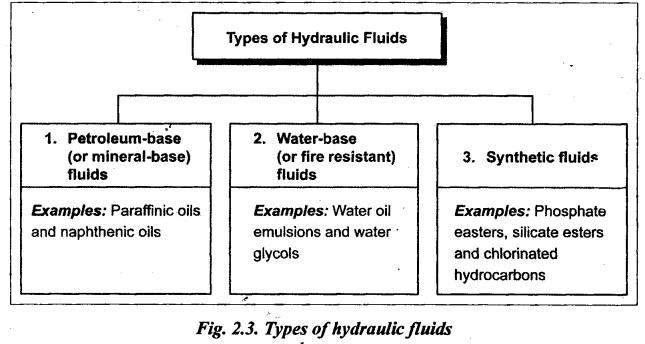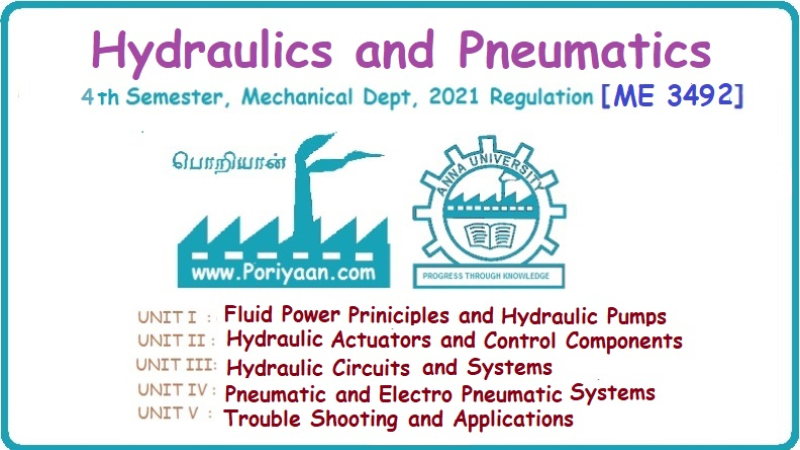Hydraulics and Pneumatics: Unit I: Fluid Power Priniciples and Hydraulic Pumps
Types of Hydraulic fluids (classification of hydraulic fluids)
Petroleum-Base (or Mineral-Base) Oils, Water-Base (or Fire-Resistant) Fluids, Synthetic Fluids
Nowadays a wide range of hydraulic fluids are used in industries.
TYPES OF HYDRAULIC FLUIDS (CLASSIFICATION OF HYDRAULIC FLUIDS) • Nowadays a wide range of hydraulic fluids are used in industries. Because of the wide and vastly different areas of application, the hydraulic fluids have been classified by many different systems based on their different characteristics such as physical properties, chemical types, operating capabilities, utility, or specific applications. Difference between an emulsion and a foam : An emulsion is defined as an intimate dispersion of one liquid within another. It is a mixture of two liquids and not a solution with one liquid dissolved in the other. A foam is an emulsion in which the dispersed phase is a gas rather than a liquid. • Depending upon the base used for making the hydraulic fluids, they are broadly classified into three classes, as shown in Fig.2.3. Now we shall discuss the above hydraulic fluids, briefly, in the following sections. 1. Description • Petroleum-base hydraulic fluids, also known as mineral oils, were among the first liquids employed as hydraulic or power transmission fluids. • Petroleum-base oils are the most widely used fluids today. • The properties of a mineral-base oil depends on: (i) the additives used, (ii) the quality of the original crude oil, and (iii) the refining process. • Additives in a mineral-based oils offer a range of specific performance characteristics. • The typical petroleum-base oils include: Napthenes, aromatics, paraffins, wax and olefins. • Paraffinic oils have higher viscosity index compared to naphthenic oils, that's why they are more suitable for the hydraulic systems where the oil temperature varies greatly. 2. Advantages of Petroleum-Base Oils (i) Good lubricating characteristics. (ii) Protection against rust, corrosion, sludge, and foam formation. (iii) Longer life. (iv) Better heat dissipating capability. (v) Better sealing property. (vi) Generally these oils have a high viscosity index (approximately 100) so that they may be used over a wide temperature range. 3. Disadvantages of Petroleum-Base Oils (i) Low fire resistance. (ii) Tendency to oxidize rapidly. 1. Description • Water-base fluids are used for fire-resistance due to their high-water content. That's why these fluids are also known as fire-resistant fluids. • The two types of water-base fluids are: 1. Water emulsions, and (i) Oil-in-water emulsions, (ii) Water-in-oil (invert) emulsions, and 2. Water glycol blends. 2. Water Emulsions • Emulsions are water-oil mixtures. • The emulsions are available in two general types: Oil-in-water emulsions or water-in- oil emulsions. • The oil-in-water emulsion has water as the continuous base and the oil is present in lesser amounts as the dispersed media. In the water-in-oil emulsion, the oil is in continuous phase and the water is the dispersed media. • Advantages of water emulsions are: (i) Acceptable corrosion and lubricating properties. (ii) Emulsion stability. (iii) High viscosity index. (iv) Film strength. (v) Good system cooling. (vi) Compatibility with most materials. (vii) Oxidation stability. (viii) Reasonable material cost. • Disadvantages of emulsions are: (i) Depletion of water due to evaporation. It will reduce the viscosity of the fluid and decrease the fire resistance. (ii) Demulsification may be a regular problem with water-in-oil emulsions. 3. Water Glycols • Water glycol contains 35-60% water, a glycol, and a water-soluble thickener to improve viscosity. • Additives are also added to improve anticorrosion, antiwear, and lubricity properties. • It is generally considered as fire-resistant. • Advantages of water glycols include: (i) Better fire resistance. (ii) Comparatively less expensive. (iii) Compatible with most pipe compounds and seals. • Disadvantages of water glycols include: (i) Fairly low viscosity. (ii) Poor corrosion resistance. (iii) Not suitable for high pressures or loads. 1. Description • Synthetic fluids are the laboratory-synthesized chemicals, which are less flammable than petroleum oils. • Also synthetic fluids exhibit excellent viscosity and lubrication characteristics. They are used in high-pressure and high-temperature hydraulic systems. • Typical synthetic fluids are: 1. Phosphate esters, 2. Silicate esters, and 3. Chlorinated hydro-carbons. 2. Advantages of Synthetic Fluids (over Petroleum-Base Fluids) (i) Excellent lubricant. (ii) Excellent fire-resistant properties. (iii) Good oxidation stability. (iv) Good viscosity-temperature characteristics. (v) Non-flammable. (vi) Suitable for high-pressure and high-temperature applications. 3. Disadvantages of Synthetic Fluids (i) More expensive than other fluids. (ii) High acidity causes corrosion and accelerates the rate of hydrolysis leading to deposit formation. (iii) May be slightly toxic and require special disposal. (iv) Often not compatible with standard seal materials. Note 1. Fire-resistant fluids : A fire resistant fluid is one that can be ignited but will not support combustion when the ignition source is removed. Some of the fire resistant fluids are water-in-oil emulsions, water glycols, and straight synthetics such as phosphate esters and chlorinated hydrocarbons. 2. Hydraulic fluid additives: • In order to enhance the hydraulic fluid properties as per the system requirements, additives are added to the fluid. • Common hydraulic fluid additives include: (i) rust and oxidation inhibitors (R&O), (ii) anti- corrosion agents, (iii) anti-wear (AW) and extreme pressure (EP) agents, (iv) viscosity index (VI) improvers, and (vi) defoamants. 3. Environmental fluids: The use of environmentally safe hydraulic fluids in place of conventional petroleum-based hydraulic oils is highly recommended. To be classified as environmentally safe, a fluid must be biodegradable and non-toxic. The biodegradable hydraulic fluids are made from vegetable oils, synthetic esters, and polyglycols. 4. In the pneumatic systems, 'the commonly used fluid is air. The characteristics, advantages, disadvantages will be discussed in detail, in Chapter 10.
1. Petroleum-Base (or Mineral-Base) Oils
2. Water-Base (or Fire-Resistant) Fluids
3. Synthetic Fluids
Hydraulics and Pneumatics: Unit I: Fluid Power Priniciples and Hydraulic Pumps : Tag: : Petroleum-Base (or Mineral-Base) Oils, Water-Base (or Fire-Resistant) Fluids, Synthetic Fluids - Types of Hydraulic fluids (classification of hydraulic fluids)
Related Topics
Related Subjects
Hydraulics and Pneumatics
ME3492 4th semester Mechanical Dept | 2021 Regulation | 4th Semester Mechanical Dept 2021 Regulation
